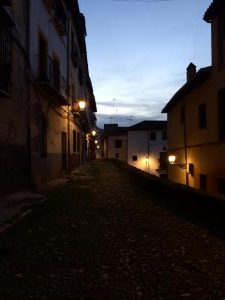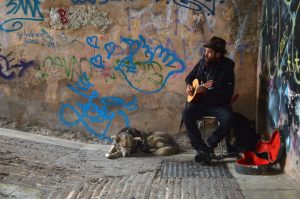A curious thing happened yesterday.
I was sitting in one of my favorite places in the Albaicín — a small courtyard with two benches and two purple flowering trees that smell a bit like lilac, though I’m not sure what they are. I came there to read, and brought along a guitar just in case I remembered how to play it.
In the distance I could hear people laughing and talking on a terrace somewhere. A bit of a rowdy crew, they shouted shrilly over music from speakers.
After a while, I began to pick out the sound of guitar strumming, and quickly recognized the tune. I don’t know the song’s name, but I knew I had heard it before. A couple of months ago I was in Bath, England with my mom. In one of the town’s main squares we encountered a street artist and chatted with him after he finished his first set. He told us he had been to Spain before, though not Granada. When we parted he said “encantada,” which is how Spaniards say “nice to meet you.” Accustomed to the Latin American “mucho gusto,” this was the first time I heard the Spanish phrase.
Sitting in that courtyard I could have sworn that I heard one of his songs drifting toward me. I jumped up from my bench made my way up the hill.
I stopped first at the terrace, where kids that looked about high school age crowded around speakers laughing and smoking. The smoke from the cigarettes danced in the sky, framing a view of the Alhambra, a Moorish fortress and UNESCO World Heritage Site over one thousand years old. I asked an older woman on a bench if she could hear the guitar and she pointed from where I had come.
“La esquina [the corner],” she said with a sideways nod. I thanked her and she puffed her cigarette, staring blankly at the World Heritage Site in front of her the way a kid might stare at a convenience store through a car window while waiting for their parent to emerge.
I hurried down the cobbled steps, guitar swinging at my side, feeling slightly cooler than normal since I had just purchased a new pair of sunglasses for eight euros. I was on a mission.
Rounding the corner I came unto a small sunlit plaza where nicely dressed couples sipped wine in fold up chairs under balconies full of potted plants and strung with ivy. In front of an old church sat a man with a guitar and dreadlocks — not the one I was looking for. I approached him as his song ended and asked what it was called. He gave me a puzzled look.
“English?”
“Oh… yeah, sorry,” I said, feeling a bit silly, as I always do when I choose the wrong language. “I was just wondering what song you were playing.”
“It’s from my country,” he said. “Czechoslovakia.” We made small talk for a bit and I found out he’s lived here for a couple of years. I asked him what he does and he looked confused again, perhaps surprised that I was asking him if he had a more “regular” job.
“Mostly music, I guess.”
It turns out he’s been living in a cave in Sacromonte, the neighborhood just beside the Albaicín. Some Romani families have been living there for generations, but more recently the caves have become a popular spot for bohemian travelers.
I explain my quest to him and ask him if he’s heard another guitar close by. He hasn’t, but as we chat the soothing notes of Simon and Garfunkel float by my ear, so I bid farewell to follow them.
One of the first things that surprised me upon arriving in Granada was the way sound travels through the city. The tall looming buildings and thin winding alleyways were once meant to provide shade and confuse enemies. Today they produce echos, only audible at night, when less people are about. The diffusion of sound makes it so that turning a corner could transform a peaceful evening into a ruckus. I wonder if such a quality works to the advantage of street musicians, who can choose virtually any corner of the Albaicín to claim for their own.
Following the sounds of S&G I weaved down a thin alleyway to find a young man leaning against the wall playing a beautiful rendition of “Sounds of Silence.” He wasn’t the right one, but he had a similar style to the man from England, so I hung around until the song ended.
“Excuse me,” I said in English, as that was the language he was singing in. “What was the song you were playing before this one?” He didn’t follow.
“Mejor ingles o español?” I offered, thinking I would make sure this time.
I don’t like to assume that people around me will speak English, but it’s often true. Many of the people I’ve met in Europe speak at least three languages, if not more. I have friends from Sweden and France who speak English quite well, but we always converse in Spanish. It feels better that way — the conversations are less lopsided when we walk on neutral ground.
The man with the guitar said either language was fine with him, so I asked again in English.
“I just got here,” he said. “This is my first song.”
I explained my predicament, and we chatted a while. When he said he was from Venezuela I figured I’d switch back to Spanish. The conversation quickly became dry and my hope of finding my friend was beginning to dwindle. At this point, though, I thought I might as well keep moving upward. I walked past some foreign backpackers and a man playing a flute against an iron gate strung with flowers.
A few more twists and turns and I had arrived at a large open plaza bordered by gardens. I chuckled when I saw it, because it was full of musicians of various types, and I knew I had entered a live-action game of Where’s Waldo.
I weaved through a crowd of hippies with steel pans, xylophones and some long sticks filled with something that jingles. I peered around at the eclectic mix of young dreadlocked couples and middle-aged British tourists. In the center of the square women in baggy clothes twirled hula hoops around their arms and waists and the sun began to set over the Alhambra. Everything smelled like weed.
I scanned the crowd with one last sliver of hope for my friend from Bath. My eyes locked on a guitar player with a hat. He looked up and saw me staring.
“Hello!”
A brit, but not the right one.
When night began to fall I abandoned my quest. The passionate cries of flamenco singers and the sound of hands keeping time faded into the distance as I descended back into reality.
On my way down the hill I made acquaintance with a British woman of about 50. She had a swagger in her step and a slur in her words.
“Why are you walking this way when the music’s up there?” she protested. “You’ve got a guitar, haven’t you?”
“I don’t play well,” I responded with a laugh.
She sized me up.
“I can tell from your energy… or something… you’re destined to be a musician,” she mused, squinting at me.
I doubt it.
“It’s magic up there,” she said, nodding at the hill.
She’s not wrong.



